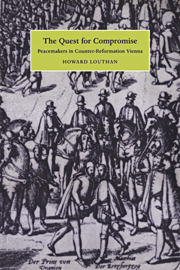Book contents
- Frontmatter
- Contents
- List of illustrations
- Acknowledgments
- A political and cultural chronology
- List of abbreviations
- Introduction
- PART I THE EMERGENCE OF AN IRENIC COURT
- PART II MAXIMILIAN II AND THE HIGH POINT OF IRENICISM
- Introduction
- 3 Hugo Blotius and the intellectual foundation of Austrian irenicism
- 4 Ordering a chaotic world: the reformation of the imperial library
- 5 Protestant ecumenism and Catholic reform: the case of Johannes Crato
- 6 Finding a via media: Lazarus von Schwendi and the climax of Austrian irenicism
- PART III THE FAILURE OF IRENICISM
- Conclusion: Storm clouds on the horizon: from the great milk war to the Thirty Years War
- Epilogue: The wider circle of irenicism
- Select bibliography
- Index
- CAMBRIDGE STUDIES IN EARLY MODERN HISTORY
3 - Hugo Blotius and the intellectual foundation of Austrian irenicism
Published online by Cambridge University Press: 03 December 2009
- Frontmatter
- Contents
- List of illustrations
- Acknowledgments
- A political and cultural chronology
- List of abbreviations
- Introduction
- PART I THE EMERGENCE OF AN IRENIC COURT
- PART II MAXIMILIAN II AND THE HIGH POINT OF IRENICISM
- Introduction
- 3 Hugo Blotius and the intellectual foundation of Austrian irenicism
- 4 Ordering a chaotic world: the reformation of the imperial library
- 5 Protestant ecumenism and Catholic reform: the case of Johannes Crato
- 6 Finding a via media: Lazarus von Schwendi and the climax of Austrian irenicism
- PART III THE FAILURE OF IRENICISM
- Conclusion: Storm clouds on the horizon: from the great milk war to the Thirty Years War
- Epilogue: The wider circle of irenicism
- Select bibliography
- Index
- CAMBRIDGE STUDIES IN EARLY MODERN HISTORY
Summary
In March 1575 Emperor Maximilian II appointed the Dutchman Hugo Blotius (ill. 9) the first official curator of the imperial library. At first glance the emperor's decision to assign Blotius this position does not seem particularly significant. He was an apt linguist and capable humanist scholar. He had taught at Johannes Sturm's academy in Strasburg, and in Vienna he had a powerful circle of allies and patrons who advocated his cause before the emperor. But when we examine the circumstances surrounding his appointment more carefully, a different story emerges. Hugo Blotius was in fact an unlikely candidate for such a position. The rise of an obscure humanist from a Calvinist background to a coveted post at the court of the titular leader of Catholic Europe was an astounding accomplishment. His very presence at the emperor's court was testimony to the profoundly irenic temper of Habsburg Vienna especially when we consider that Maximilian was no friend of the Calvinists. His odyssey to the imperial court and his survival in a confessionally hostile environment speaks directly to the strength of the Austrian via media.
Success at court was generally dependent on two related factors. The courtier was above all a political animal who knew how to construct an intricate web of relationships. The support of these patrons was critical for obtaining and maintaining the emperor's favor. Secondly, to retain the goodwill of his patrons and fend off the attacks of his enemies the courtier learned to gauge his speech and actions strategically. Competition was fierce, and one quickly made enemies who would not hesitate to exploit national and religious tensions to discredit their rivals.
- Type
- Chapter
- Information
- The Quest for CompromisePeacemakers in Counter-Reformation Vienna, pp. 53 - 66Publisher: Cambridge University PressPrint publication year: 1997



